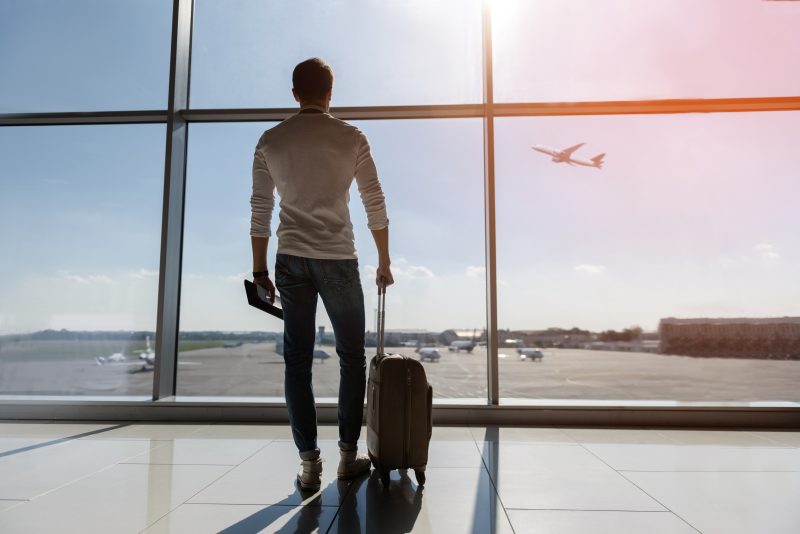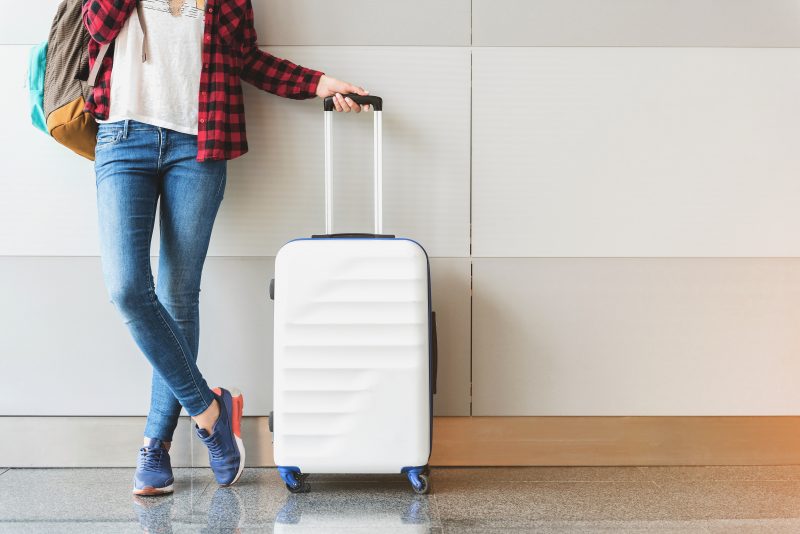How to Reduce the Effects of Jet Lag
Signing up for credit cards through partner links earns us a commission. Terms apply to the offers listed on this page. Here’s our full advertising policy: How we make money.
INSIDER SECRET: There’s no fast fix or “cure” for jet lag, but apps like Timeshifter can help your body handle it better.Insomnia. Exhaustion. Stomach issues. Difficulty concentrating.
These are all side effects of jet lag, the disruption of the body’s internal clock and circadian rhythms that happens to travelers when they cross multiple time zones.

There’s no exact science to figure out who will suffer longer or have which side effects from jet lag, but most travelers are at least mildly affected during long-haul travel. It can’t be prevented entirely and there’s no “cure,” but there are ways to avoid some of the worst effects or at least lessen them by helping your body adjust more quickly to the new time zone you’re in.
Tips for Handling Jet Lag
What to Do Before Traveling
Know your body
If you have a solid routine and need eight hours of sleep every night, don’t stay up all night before your flight to pack. If you have trouble sleeping on planes, don’t organize several meetings or tours the second your long-haul red-eye touches down. Squeeze in a nap first. If you know you need time to recover, don’t pack too much in at once. Give your body time to adjust. Knowing how your body handles time-zone transitions can be key in reducing the symptoms that affect you.
Use an app
Many apps out there claim to cure jet lag. I did notice my jet lag-induced fatigue was reduced after testing out Timeshifter, which advises travelers when to seek or avoid light, take a nap, stay awake, drink coffee, or put away screens. Its instructions are based on your age, gender, typical sleep patterns and your specific flight and travel plans. The Uplift app claims to cure jet lag using acupressure. After pressing on specific points on my arms and ankles, my jet lag wasn’t entirely gone, but I may have slept a little more soundly than usual that night.
Get plenty of rest before traveling
Starting your trip off exhausted definitely won’t help any jet-lag symptoms. Getting plenty of sleep on the nights leading up to your trip can prepare your body to deal with some of the fatigue or insomnia that may come post-flight.
Slowly adjust your internal clock before traveling
If you’re traveling east, try going to bed a little bit earlier, starting a couple of days before your departure. If you’re flying west, go to bed a bit later. Inching mealtimes a little closer to the time zone you’re flying to is another way to start preparing your body to adjust to your new destination even before departure.
What to Do During Travel
Hydrate
It’s easy to get dehydrated on planes because of the dry air and reduced humidity on board. Dehydration definitely won’t help your jet lag. In fact, many dehydration symptoms are remarkably similar to jet lag symptoms: lack of energy, sleepiness, irritability, dizziness.
Drinking lots of water before, during and after your flight won’t completely erase your jet lag, but it should help.
Make yourself as comfortable as possible
Prepare ahead of time for your flight and bring things that will make you comfortable (and allow you to sleep, especially when flying east or on a red-eye). This can include, but isn’t limited to, a neck pillow, eyemask, earplugs and noise-canceling headphones. Having an essential oil or lavender spray can help you to relax too.
Seat choice is also important. For sleep, pre-select a window seat. Nervous flyers or those who like to get up often will feel more comfortable on an aisle.
Bringing your own food and drinks is also a way to ensure you’ll eat and drink what you want, when you want. I always bring a large bottle of water and my own snacks. Eating salty airline food makes me feel ill and bloated on planes, so I prefer to munch on light, healthy snacks like nuts or fruit. And I prefer to hydrate when I want, with my own water, not when the flight attendants decide to finally roll the cart around and offer me a drink. Getting up to stretch and move around the aircraft will keep your blood flowing and prevent clots.

Avoid/minimize inflight alcohol consumption
I often break my own rule and have a glass of wine or two on a long flight. It’s normal to want to enjoy a little booze — especially when it’s free. But the best way to stay as fresh as possible is to avoid alcohol (almost) entirely when flying. It contributes to making you even more dehydrated, and the low oxygen levels on board help the alcohol to metabolize faster, making you feel more intoxicated quicker than you would on the ground. You may feel more tired and dehydrated after your flight than you would if you simply drank water. If you do drink onboard, don’t let it get excessive, or you’ll feel the effects afterward. And alternate with plenty of water, too.
What to Do After Arrival
Adapt to your new schedule
Once you’ve arrived, try to adjust to the new schedule as best you can, eating meals at normal times and going to bed/waking up at regular hours. Naps can help with fatigue, but keep them short so you don’t disturb your circadian rhythms even more.
Regulate light exposure
Light naturally regulates circadian rhythms, so get sunlight whenever possible during daylight hours. Plan to be in bright light in the early evening when traveling west, and in the morning when traveling east.

Try melatonin or other aids
Melatonin is a hormone that helps regulate circadian rhythms. It’s been known to help those suffering from jet lag as it signals the body that it’s time to sleep. Taking it on a plane or before bed in your new time zone may help you asleep. But it is a hormone that does affect your body’s natural rhythm, so speak to your doctor before taking it, and don’t plan to take it indefinitely.
Many travelers swear by other sleep-inducing medicines, both prescription and over-the-counter, but I highly recommend discussing these options with your doctor. If the doctor says they’re OK, try them at home before ingesting anything new at 38,000 feet or in a new destination.
Eat and drink healthy
Another way to adjust to the new time zone upon arrival is to eat and drink healthy, always at normal mealtimes. Take it easy on the greasy, heavy foods or excessive amounts of alcohol, which can affect your sleep quality. Since jet lag often comes in the form of stomach problems, eating right will help get your gut get back on track too.
Get exercise
Doing yoga and exercise before, during and after the flight can help reduce the effects of jet lag. Doing CrossFit or vinyasa in the galley isn’t really an option during the flight, but doing so before and after flying can help your body adjust better. And making little stretches and movements in your seat or the aisle will help.

Exercise increases oxygen flow to your blood and helps regulate your energy levels. Even light stretching can help you feel better after a long flight, especially if you’ve been crunched up in a small economy seat for several hours.
For the latest tips and tricks on traveling big without spending a fortune, please subscribe to the Million Mile Secrets daily email newsletter.Editorial Note: We're the Million Mile Secrets team. And we're proud of our content, opinions and analysis, and of our reader's comments. These haven’t been reviewed, approved or endorsed by any of the airlines, hotels, or credit card issuers which we often write about. And that’s just how we like it! :)






Join the Discussion!